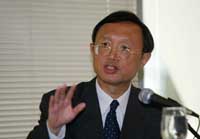China suddenly appoints new foreign minister in early reshuffle of top jobs
China's government abruptly replaced its foreign minister Friday, elevating former Ambassador to the United States Yang Jiechi to the post in an early reshuffling of top positions ahead of key political meetings.

The removal of Li Zhaoxing as foreign minister had been widely expected - but not until much later this year, when the ruling Communist Party convenes a once-every-five-year congress to reapportion top jobs.
At 66, Li was already a year past the customary retirement age for Cabinet ministers. Along with Li, the ministers of land resources and science and technology also retired Friday, and the executive committee of the national legislature announced their replacements, the government's Xinhua News Agency reported.
The transition at the Foreign Ministry was unlikely to substantively alter China's foreign policy at a time when Chinese economic and diplomatic might are surging.
Major policy directions are set by the communist leadership, especially President Hu Jintao, who has built a more assertive diplomacy to protect Chinese interests while avoiding major conflict.
The new foreign minister, like his predecessor, is a career diplomat regarded as an expert on U.S. affairs - signaling the importance China places on steady relations with the superpower.
"China emphasizes major-power foreign policy, and the U.S. is the most important major power," said Shen Dingli, dean of the Institute of International Studies at Fudan University in Shanghai. "Other countries can rest assured that foreign policy will not change."
The Cabinet reshuffle was another sign of Hu's firmer hold on power after five years on the job. He is certain to be given a second term at the party congress, which is expected to be held in the fall and which normally invites fractious infighting.
Two of the departing ministers, Foreign Minister Li and Science and Technology Minister Xu Guanhua, were closely associated with Hu's predecessor, Jiang Zemin, who has retired but retains a waning influence.
The Foreign Ministry and the Ministry of Land Resources - whose head also stepped down - are dealing with emerging policy lapses. Under Land Resources Minister Sun Wensheng, protests by farmers over land confiscations for development have soared while the amount of farm land nationwide has fallen to what the government says is a critically low level.
Meanwhile, at the Foreign Ministry, a former ambassador to South Korea was quietly cashiered last year, either for corruption or possibly passing confidential information to South Korea, according to a senior Chinese foreign policy expert and South Korean media.
More pugnacious than charming, Li often struck an undiplomatic posture internationally. As ambassador to the U.S., Li excoriated Washington for what it said was the accidental bombing of the Chinese Embassy in Yugoslavia in 1999 during the Kosovo War. He often testily rebuked journalists for questioning China's hunt for resources in Africa and Latin America.
The 57-year-old Yang is more low-key in approach. Shortly after becoming ambassador to Washington, Yang worked to defuse tensions after a U.S. EP-3 spy plane collided with a Chinese fighter jet and the plane and its crew were held at a Hainan island air force base in 2001.
A native of Shanghai, Yang studied at the London School of Economics in the early 1970s as part of an effort to revive China's diplomatic corps devastated by persecution during the radical Cultural Revolution.
Yang once served as an interpreter for George H.W. Bush in the mid-1970s when he ran the U.S. liaison office in Beijing, and Bush reportedly gave Yang the nickname "Tiger."
That relationship with the senior Bush, as well as Yang's command of English and experience, were among the reasons he won appointment as ambassador to the U.S. when George W. Bush became president. In the wake of the EP-3 incident, Yang earned kudos for helping Beijing and Washington find common cause in combating terrorism.
Yang suffered a heart attack during his tenure. His health continues to be weak, Chinese Foreign Ministry and international affairs experts have said, raising questions about whether he will be able to maintain a robust travel schedule as foreign minister.
Subscribe to Pravda.Ru Telegram channel, Facebook, RSS!




